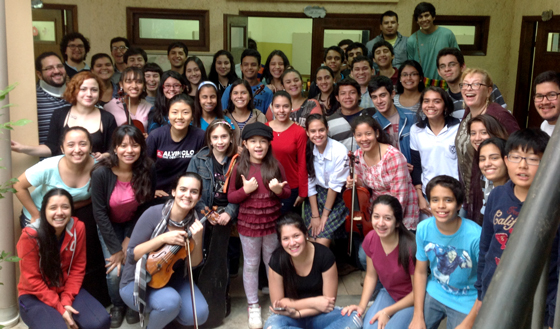Written on the blackboard of a classroom at Escuela Musica Miranda – a privately run school of music in Asuncion, Paraguay – was a question that inspired Wichita State University’s Catherine Consiglio: "What is music for?"
A dozen answers to that question were written like a thought cloud around it by Escuela Miranda’s Spanish-speaking students: “para escuchar” – to listen; “para tabajar en equipo” – to work together; “para crecer” – to grow; “para fortalecer” – to strengthen; “para convivir” – to live.

Catherine Consiglio
Consiglio, an associate professor of music in the WSU College of Fine Arts, took her sabbatical this spring and spent three weeks in Asuncion, where she visited schools to build relations and nurture local talent.
While there, Consiglio taught two master classes at the University National of Asuncion (UNA) and took part in two concerts: the first a chamber music evening celebrating the relationship between Paraguay and Kansas; the second a concert at the Argentinian embassy in Asuncion where she soloed with the Camerata Miranda on a piece Consiglio arranged for solo viola and string orchestra. Her most extensive residency during the trip, however, was with Escuela Miranda, where Consiglio taught five different chamber ensembles, countless private viola lessons and one class.
Altogether, Consiglio taught more than 60 students during her time in Paraguay.
“The children at Escuela Miranda are just exceptional, exceptional students,” she said. “They’re grateful for the help that we give them, and they have so much respect and reverence for music. It’s incredible.”
One performance of the Tchaikovsky Serenade, by an orchestra composed of all levels of Escuela Miranda students, left Consiglio in tears, she said.
“It wasn’t the most polished performance, but it was one of the most passionate I’ve ever heard. The technique of our orchestras here is so advanced, but our passion isn’t always there. These kids – they’ve got it. They just blew me away.”
Cultivating talent
This was Consiglio’s second trip to the South American country, and the second opportunity she’s had to interact with the Miranda school.
Consiglio began her quest to bring Kansas music education to Paraguay two years ago. At that time, she said, there were no students in the WSU music department from Paraguay. A partnership program started by the Department of Education was the initial bond between Kansas and Paraguay, establishing in-state tuition and other incentives.
“We have such an incredible music department at WSU,” Consiglio said. “The kids at the Miranda school are talented and hard-working, and I want to make this door open to them.”
One of the first fruits of Consiglio’s efforts is Pedro Oviedo, a violist and graduate of Escuela Miranda, who transferred from Pittsburg State University to WSU and has been working this summer in Wooser, Ohio, for the Ohio Lite Orchestra.
“Leaving behind my family and everyone I knew was really hard,” Oviedo said. “Becoming a student abroad was a big challenge, but there was only one degree-offering college in music back home, so I did my research. I knew I wanted more.”
Oviedo was introduced to classical music by his father, but his fist opportunity to learn it was a national program that promoted music education by sending music teachers around to outlaying populations. Although it had been Oviedo’s childhood dream to learn to play the saxophone, the travelling teachers only came equipped with two violins a viola and a cello, so the viola is what he mastered.
Making a difference
Classical music has only recently been embraced in Paraguay, Consiglio said. With only a 30-year legacy, there is a sense of newness and energy she found attractive.
“They’re so excited about it,” she said. “These kids will ride on a bus for two or three hours, one way, to get to a rehearsal on the weekend. They are so dedicated and deserving and hungry for advanced music teaching.”
Escuela Miranda has made a difference by laying a foundation for the future of classical music in Paraguay, giving top students a chance to join a professional orchestra as early as 15 years old, and can earn more than $300 a month.
“That can make the difference of whether their family has running water,” Consiglio said. “A string player in Paraguay can now go out and help support their family – isn’t that wonderful?”
Consiglio credits much of that change to the efforts of the school founded and operated by Jose Miranda and his sons from their own house, taking in students as young as 4 years old and teaching them more than just how to play an instrument, but the fundamentals of music.
Some of the Paraguay’s finest musicians, including Romero Miranda, one of the sons of Escuela Miranda’s founder, are studying advanced music in the United States and will someday return with their expertise to bring Paraguay up to the next level.
Oviedo plans to follow that path.
“When I’m done I would for sure like to go back to Paraguay and do something there,” Oviedo said. “It’s motivating, because there’s so much to be done.”
While Consiglio plans to continue working with music educators, students and musicians in Paraguay, she also hopes to involve more people here in Wichita.
“I want to start conversations in this community about helping students from Paraguay overcome the challenges of studying here,” she said. “It’s not just about money, but language and food and housing. If there were families that would be willing to host a Paraguayan student studying at WSU, it would eliminate the barrier of living expenses. That would be one step.”
Thinking back to the photo she took of the blackboard in Escuela Miranda motivates Consiglio to continue trying to make a difference there.
“It was just the most amazing thing,” she said. “To think what these kids and their families sacrifice to send them to study music – it inspires me. Music has become so important in their lives, and I want helping them come to WSU to study to be my legacy at Wichita State.”


 Courtesy
Courtesy